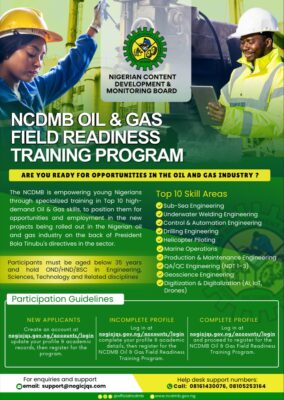The Nigerian Content Development and Monitoring Board (NCDMB) has launched a major Human Capital Development (HCD) programme aimed at training over 10,000 Nigerians in top-demand technical and professional skills in the oil and gas industry.
The initiative, tagged the Oil and Gas Field Readiness Training Programme, is designed to equip young graduates and technicians with practical skills needed for emerging opportunities in the sector, following renewed investments and Final Investment Decisions (FIDs) by both international and indigenous operators.
Announcing the programme, the Executive Secretary of NCDMB, Engr. Felix Omatsola Ogbe, said it was developed to bridge critical skills gaps identified through the Board’s review of expatriate quota applications and consultations with key industry stakeholders, including the Petroleum Technology Association of Nigeria (PETAN), Oil Producers Trade Section (OPTS), and Petroleum Contractors Trade Section (PCTS).
According to Ogbe, the top 10 high-demand skill areas covered by the programme include subsea engineering, underwater welding, control and automation, helicopter piloting, seamanship, production and maintenance engineering, QA/QC engineering, geoscience, and emerging digital technologies such as artificial intelligence, machine learning, and drone operations.
He explained that the initiative aligns with Section 10(1b) of the Nigerian Oil and Gas Industry Content Development (NOGICD) Act, 2010, which mandates that Nigerians be given first consideration for training and employment opportunities in oil and gas projects.
The training programme is open to Nigerians below 35 years of age with OND, HND or BSc qualifications in Petroleum, Mechanical, Chemical, Electrical, Civil, Gas, Welding, Metallurgy, Geology, Geophysics, Computer Science, Engineering or other related fields.
Applicants are required to register and update their profiles on the NOGIC Joint Qualification System (JQS) portal at nogicjqs.gov.ng and may select up to three skill areas in order of preference.
Providing further details, NCDMB’s Director of Capacity Building, Engr. Bamidele Abayomi, said the programme would run for two to three years, after which the skills landscape would be reviewed to determine whether the identified training areas should be continued or modified.
He emphasised that the initiative is part of NCDMB’s broader effort to ensure Nigerians are adequately prepared to take on specialised roles in the country’s fast-evolving oil and gas industry.





